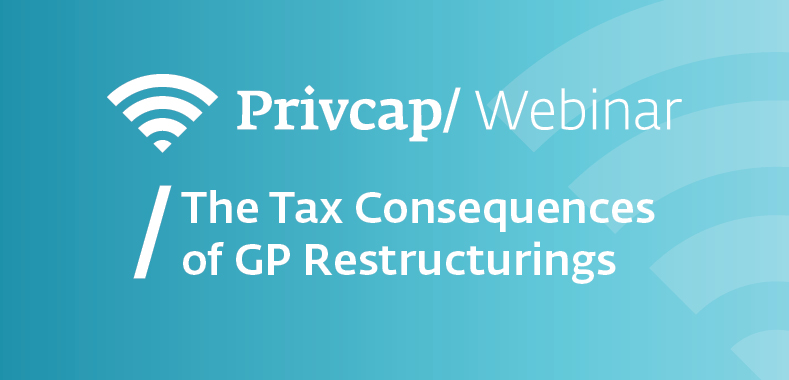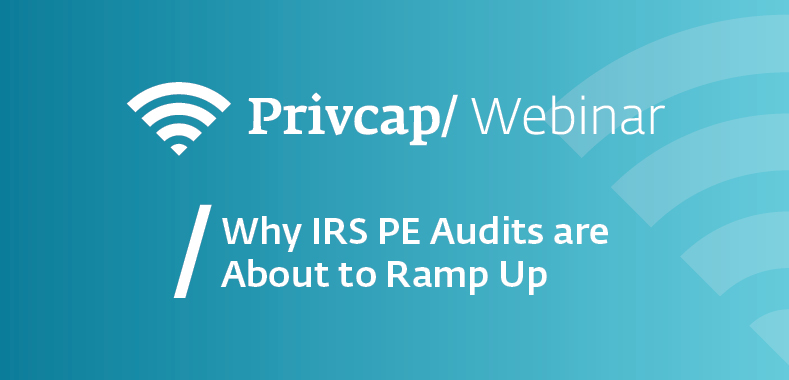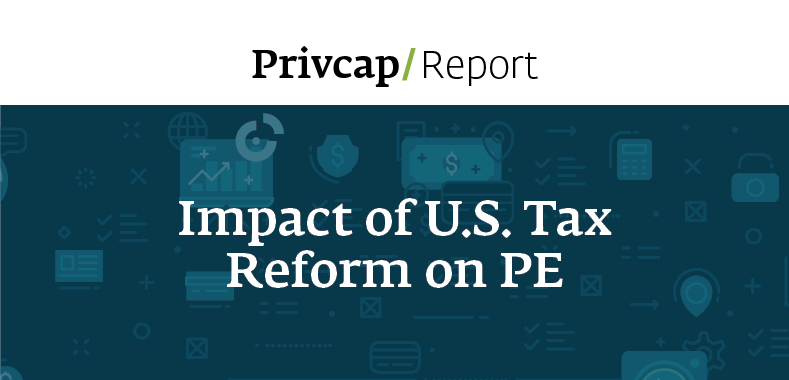The IRS Is Targeting Partnerships – Is Yours Next?
Download the article here
With the enactment of the Bipartisan Budget Act of 2015, the private capital industry should expect major changes to the way the IRS conducts taxpayer audits. Donald Susswein of RSM and noted tax attorney Fred Witt outline these changes and what they mean for managers of private funds.
Privcap: Why does the private funds industry now find itself in the cross-hairs of the IRS?

RSM US LLP
Donald Susswein, RSM: There’s a huge divide politically and culturally in this country related to issues of fairness or perceived fairness in our economy, with a particular emphasis on what people pay or should pay in taxes. Partnerships of all kinds have become the poster child for that conflict. Congress basically sent the IRS a message: “You better go audit
some partnerships.” That is coming. The new rules are going to take effect for any items of partnership income or deduction arising after the end of 2017. The enhanced audits probably won’t begin until 2020, but the new rules begin to apply only a few months from now, and the IRS is really gearing up to go after partnerships.
Fred Witt, Fred Witt PLC: In the last 10 years, there’s been a sea change away from regular corporations and S corporations to the use of LLCs taxed as partnerships. The IRS and Congress perceive themselves to be a little bit behind the curve, and they are reacting to this dramatic shift in the marketplace.

Fred Witt PLC
Susswein: Fred, once the IRS does start auditing partnerships more, what are they likely to be focusing on?
Witt: Let’s talk about LLCs taxed as partnerships. LLCs need to file Form 1065 annually. The first question will be: Who can sign the tax return? You might think, “Gosh, isn’t that just assumed?” The answer for LLCs is no. For an LLC, the IRS tax return specifies that a “member manager” should sign the return. The term “member manager” is found nowhere else in the law. It’s a creation of the IRS. This has important and critical consequences, because if the wrong person signs the return, it’s the IRS’ position that the return is invalid. If it’s invalid, the statute of limitations never begins. Every business owner and operator needs to drill down and check their documents to make sure that these matters are being addressed.
Susswein: I was recently having a conversation with an attorney representing another party. The attorney said, “Surely the IRS will recognize that this is just a foot fault. They’re not going to hang a taxpayer out just for missing a technicality.” I laughed, because that’s the lifeblood of the IRS, right? If you violate a technical rule, that’s one of the great ways they can get you!
Witt: Don, that’s exactly right. The IRS has proposed these technical rules and has made the change for the first time in 30 years with the idea of increasing audit activity. They are going to want to collect whatever additional taxes are due. If they can do it based on a technicality, such as “The wrong person signed the return, and the statute of limitations never began,” that, to the IRS, is a benefit. It makes it easier if they can get you on a technicality rather than trying to dive into the very complex, as they say, spiderweb of partnership tax.
Susswein: I’ve also heard there’s a lot about fee waivers, carried interest, and profits interests in the private capital industry. Are those also areas that the IRS is going to be looking at?
Witt: They are. Carried interest has gotten a lot of discussion because of the legislative attempts to change the treatment of carried interest.
As for fee waivers, the IRS andpolicymakers have a hard time having a lot of sympathy for a taxpayer who gives up $1 million of ordinary fee income in exchange for $1 million of somewhat speculative capital gains, even if there is some risk the gains won’t arise.
Can you talk about the new partnership procedure rules intended to make it easier for the IRS to audit private partnerships?
Susswein: Let me try to give you a little bit of a summary: Partnerships file a single tax return, and the positions on that tax return are generally applicable to all of its partners in the partnership. They take their share of the partnership’s income and put it on their individual return. However, a partner, if he or she wants to, can take a position that’s inconsistent with the position of the rest of the partnership. That has been the law for many, many years. If the IRS
wanted to audit the partnership, they would audit the partnership, but almost every partner in the partnership had the right to take an inconsistent position on his or her own personal return.
The IRS had to deal with potentially hundreds of different positions on the same tax issue. It was very, very complicated. It was one of the reasons why they generally avoided auditing partnerships. The big change that will be effective for 2018 is that henceforth the partnership is going to have to speak with one voice. The partnership is going to appoint somebody to have the authority to bind all of the partners in the partnership to a single tax position. This is a huge change. It’s a simplification for the IRS.
What are some of the implications for a partnership when a single person can bind the whole group to tax positions?
Susswein: It means that somebody running the show, as far as the audit is concerned, may not have your best interests at heart as a partner. You might be a private equity fund, and you’re holding a 40 percent interest or a 50 percent interest in a portfolio company, and somebody else may be controlling what that portfolio company does if they’re audited, even though the impact of the adjustment may be on your fund as the investor.
Witt: The thrust of these rules is to treat the partnership like a corporation and take all of the power, all of the decision-making, and make the partnership like a corporation for purposes of auditing and determining
additional taxes due. This means that the personal representative of the partnership has a very powerful position, and the person selected needs to be carefully identified and carefully monitored or controlled.
Susswein: There are circumstances in which a tax change that’s proposed on an audit may affect the general partner in a way that’s different from the rank-and-file investor. This is a potential morass of conflicts of interest. It doesn’t mean they can’t be resolved, but it means that unfortunately you can’t just go to a lawyer or a CPA and say, “What’s the magic language I put in my agreement? What’s the ‘boilerplate’ I can add to protect me?” It isn’t a matter of magic language. There are real business issues, real conflicts, that need to be resolved as a business matter. For example, are certain decisions so simple that we can trust the manager to do it, or are all of the decisions on dealing with the IRS going to have to be put to a vote? If they’re put to a vote, does everybody get the same type of vote?
Witt: I’ve spent the last two years in my practice drafting sample forms of the so-called boilerplate language that Don referenced. I think that section now has to be put into the trash can, because for the reason you just described, there isn’t really going to be any boilerplate that will fit.
Susswein: All of this doesn’t necessarily mean that there’s going to be an elaborate redrafting of the partnership agreement. It may be a one sentence addition. The difficult part is thinking it through. That’s the hard part. In most cases, it may not even have to be in a partnership agreement, it may just be a side agreement, or it may just be a handshake
or an understanding, but the point is, if you don’t resolve these issues before 2018, they’re going to be much more difficult to resolve later, if a real controversy develops.
Do you have clients who have said to you, “Gee, why don’t we just wait until we get audited, and then we’ll deal with this?”
Susswein: That is the normal reaction: “I don’t want to do anything until the regs come out” or “I don’t want to do anything until the technical corrections are resolved.” But just think about your private equity fund and you’re considering investing in a partnership. When you invest in that partnership, are you taking a risk for your own investors that maybe you haven’t thought through? Maybe there’s some claim that you were negligent in making an investment without your having made sure that that partnership had checked all the boxes, dotted all the i’s, and crossed all the t’s. And it’s not as easy as just finding your tax advisor and asking them to do the work. He or she doesn’t have an “easy button.” There isn’t any magic language or “simple button” they can press and all your problems are solved. It isn’t an insurmountable problem, but it’s a business problem that has to be worked through by the parties with a trusted advisor who understands the tax and business issues, not a problem of finding the right technical language to make the problem go away.
New audit rules have big implications for private equity and real estate investors.















